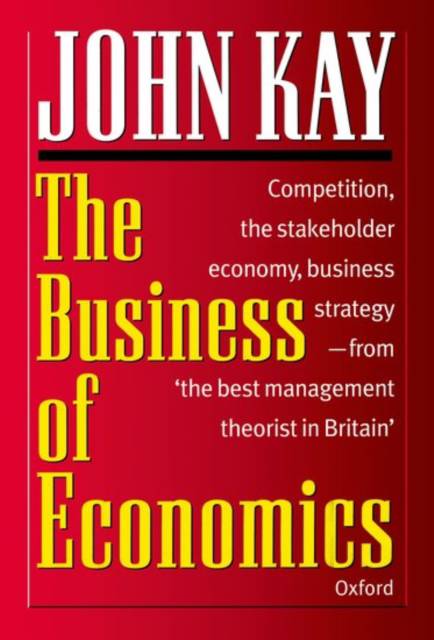
- Retrait gratuit dans votre magasin Club
- 7.000.000 titres dans notre catalogue
- Payer en toute sécurité
- Toujours un magasin près de chez vous
- Retrait gratuit dans votre magasin Club
- 7.000.0000 titres dans notre catalogue
- Payer en toute sécurité
- Toujours un magasin près de chez vous
Description
Medicine and business management share certain similarities, writes John Kay. For centuries, the theories behind medical practice were mostly nonsense. Doctors simply applied fashionable nostrums, bleeding one patient, starving another, and sometimes the patient got better, sometimes not. The prestige of a doctor rested more on the social rank of his patients and the confidence of his assertions than on the evidence of his cures. Much the same can be said of present-day management gurus. But there is one difference between medicine and management, Kay adds. In the last 100 years, medicine has been transformed by science. Management has not.
In The Business of Economics, Kay argues that it is economics that can provide the science that management presently lacks, that economics is the natural backbone of business management. In the many insightful and lively pieces collected here, Kay looks at the application of economics to the central strategic issues facing firms--their choice of activities and markets. He is particularly interested in microeconomics, the study of markets, industries, and firms, and is on the other hand highly critical of macroeconomics, economic modeling, and economic forecasting (which he says is inevitably wrong). He is especially illuminating on the recently developed resource-based theory of strategy, which attempts to explain the success or failure of a firm in terms of its "distinctive capabilities" (the factors which differentiate them from others in the same market and which cannot be easily reproduced by competitors even when recognized.) For instance, BMW's highly skilled work force, due to Germany's high level of general education, is hard to reproduce by competitors in other countries. Kay shows how BMW exploited its highly skilled labor force (opposed to low-wage foreign workers or robots found in many other auto plants) to get a large share of the market for up-scale, high-performance cars. Among the many other topics discussed in this idea-rich book are Saatchi & Saatchi's dismal attempt to globalize in the 1980s, Honda's great success selling low-end motorcycles in the U.S., the fare of the Eurotunnel, and the reason why race-car driver Nigel Mansell makes seventy-five times as much money a year as Britain's Prime Minister, John Major.
Described in Business Age as the "most important business analyst in Britain bar none," John Kay is renowned for his incisive, entertaining, and controversial columns in the Financial Times of London. In addition, he is a regular commentator on radio and TV, and is in much demand as a speaker and consultant. In The Business of Economics, he shares his thoughts on a wide range of issues facing businesses today. His clear and down-to-earth writing style informs, challenges, and entertains, and his rigorous and clever analysis of the corporate world offers insights into the business problems and decisions faced by executives and managers every day.
In The Business of Economics, Kay argues that it is economics that can provide the science that management presently lacks, that economics is the natural backbone of business management. In the many insightful and lively pieces collected here, Kay looks at the application of economics to the central strategic issues facing firms--their choice of activities and markets. He is particularly interested in microeconomics, the study of markets, industries, and firms, and is on the other hand highly critical of macroeconomics, economic modeling, and economic forecasting (which he says is inevitably wrong). He is especially illuminating on the recently developed resource-based theory of strategy, which attempts to explain the success or failure of a firm in terms of its "distinctive capabilities" (the factors which differentiate them from others in the same market and which cannot be easily reproduced by competitors even when recognized.) For instance, BMW's highly skilled work force, due to Germany's high level of general education, is hard to reproduce by competitors in other countries. Kay shows how BMW exploited its highly skilled labor force (opposed to low-wage foreign workers or robots found in many other auto plants) to get a large share of the market for up-scale, high-performance cars. Among the many other topics discussed in this idea-rich book are Saatchi & Saatchi's dismal attempt to globalize in the 1980s, Honda's great success selling low-end motorcycles in the U.S., the fare of the Eurotunnel, and the reason why race-car driver Nigel Mansell makes seventy-five times as much money a year as Britain's Prime Minister, John Major.
Described in Business Age as the "most important business analyst in Britain bar none," John Kay is renowned for his incisive, entertaining, and controversial columns in the Financial Times of London. In addition, he is a regular commentator on radio and TV, and is in much demand as a speaker and consultant. In The Business of Economics, he shares his thoughts on a wide range of issues facing businesses today. His clear and down-to-earth writing style informs, challenges, and entertains, and his rigorous and clever analysis of the corporate world offers insights into the business problems and decisions faced by executives and managers every day.
Spécifications
Parties prenantes
- Auteur(s) :
- Editeur:
Contenu
- Nombre de pages :
- 228
- Langue:
- Anglais
Caractéristiques
- EAN:
- 9780198292227
- Date de parution :
- 20-03-97
- Format:
- Livre relié
- Format numérique:
- Genaaid
- Dimensions :
- 161 mm x 240 mm
- Poids :
- 566 g

Les avis
Nous publions uniquement les avis qui respectent les conditions requises. Consultez nos conditions pour les avis.






